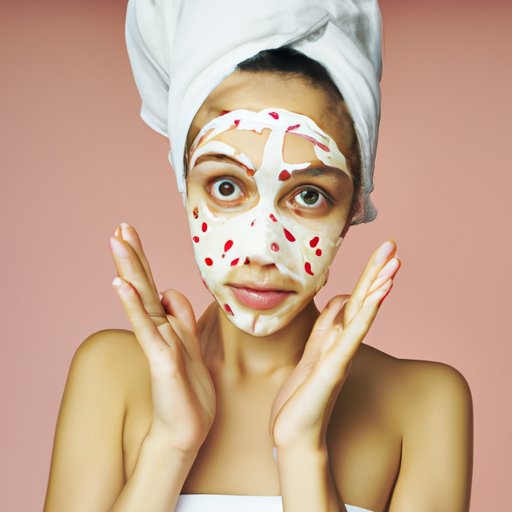Introduction
In today’s world, masks have become an essential part of everyday life. As people adjust to this new normal, many are asking: “Do masks cause acne?” This article takes a closer look at the evidence and explores the potential causes, prevention methods, and treatments for mask-related breakouts.
Examining the Evidence: Do Masks Cause Acne?
The short answer is yes, masks can cause acne. Though the exact cause is still unknown, there are several factors that contribute to the development of mask-induced acne, or ‘maskne’. These include friction from the mask rubbing against the skin, occlusion (trapping of heat and moisture), and accumulation of oils and bacteria.
Current research suggests that the combination of these factors increases the risk of developing acne. In particular, occlusion has been linked to the development of comedones (blackheads and whiteheads) and inflammatory lesions such as papules, pustules, and nodules. Furthermore, masks can also exacerbate existing acne by exacerbating inflammation and increasing bacterial growth.
A Guide to Mask-Induced Acne Prevention and Treatment
Fortunately, there are steps you can take to reduce your risk of developing maskne. First and foremost, it’s important to practice proper skincare. Make sure to cleanse and moisturize your skin daily, in order to keep it clear and healthy. Additionally, use non-comedogenic products with ingredients like salicylic acid and benzoyl peroxide that help to reduce oil production and fight bacteria.
It’s also important to choose the right type of mask. Opt for breathable materials like cotton or silk, and make sure to wash your masks regularly. Lastly, when wearing a mask, be sure to give your skin some breathing room; take regular breaks from wearing a mask and practice mindful skincare techniques like facial massage to reduce tension and stress.
If you’re already experiencing maskne, there are several treatments available. Over-the-counter products containing salicylic acid, benzoyl peroxide, and/or glycolic acid can help to reduce inflammation and prevent further breakouts. If over-the-counter products aren’t helping, consult a dermatologist for prescription medications or other treatments, such as chemical peels or laser therapy.
The Truth Behind the Myth: Dispelling the Link Between Wearing a Mask and Acne
Despite the evidence linking masks and acne, there is still a lot of misinformation out there. Some believe that wearing a mask will cause more breakouts because the trapped air creates an environment where bacteria can thrive; however, this is not true. In fact, studies have shown that wearing a mask actually reduces the transmission of bacteria and viruses.
Another myth is that masks trap sweat and oils on the skin, leading to clogged pores and breakouts. However, this is not necessarily true either. While masks may trap sweat and oils, they can also help to protect your skin from environmental pollutants and irritants, which can lead to breakouts.
What You Need to Know About Maskne (Mask-Related Acne)
Maskne is a type of acne that is caused by wearing a mask. It typically appears as red bumps and inflamed pimples around the mouth, nose, and chin area. It is important to note that while maskne can be caused by wearing a mask, it can also be caused by other factors, such as hormonal imbalances, diet, and lifestyle choices.
It is also important to understand the different types of maskne. Comedonal acne is characterized by closed comedones (whiteheads) and open comedones (blackheads). Inflammatory acne is characterized by papules, pustules, and cysts. Lastly, post-inflammatory hyperpigmentation is characterized by dark spots and discoloration.
Exploring the Causes of Mask-Related Breakouts and How to Treat Them
There are several potential causes of mask-related breakouts, including friction, occlusion, and accumulation of oils and bacteria. To reduce the risk of breakouts, it’s important to practice proper skincare, wear breathable masks, and take regular breaks from wearing a mask. Additionally, there are several treatments available for existing mask-related breakouts, including topical creams, chemical peels, and laser therapy.
Conclusion
Masks can indeed cause acne, though the exact cause is still unknown. However, there are steps you can take to reduce your risk of developing maskne, such as practicing proper skincare, wearing breathable masks, and taking regular breaks from wearing a mask. Additionally, there are several treatments available for existing mask-related breakouts. The key is to identify the underlying cause and find the most effective treatment for your specific condition.


